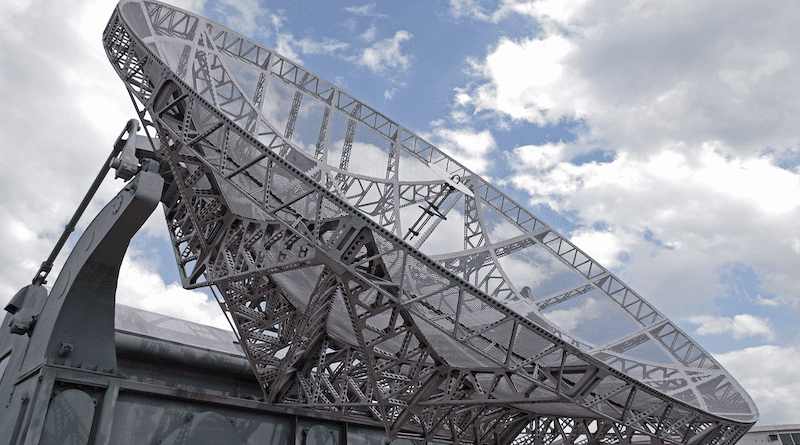Space Dragon’s Shadow In Sri Lanka Raises Questions About Its ‘Balanced’ Foreign Policy – Analysis
By A. Jathindra
How China caught up a strategic port, Hambantota is one of the most vivid examples of China’s ulterior use of loans and aid to gain influence around the world. After struggling to repay the loan, the Sirisena-Ranil government handed over the port to China on a 99-year lease in 2017.
During the handing-over ceremony in Parliament, Prime Minister Ranil Wickremesinghe said, “Hambantota will be converted to a major port in the Indian Ocean”. However, after China gained control of the port, it raised concerns that China could use it for military purposes. Former Indian foreign secretary Shivshankar Menon said, “The only way to justify the investment in Hambantota is from a national security standpoint — that they will bring the People’s Liberation Army in.”
In 2018, U.S. Vice President Mike Pence stated, “Beijing pressured Sri Lanka to deliver the new port directly into Chinese hands. It may soon become a forward military base for China’s growing blue-water navy”. Then, as usual, Sri Lankan government rejected the U.S. claim. In his Oxford University talk, Wickremesinghe emphasised,”There are no foreign naval bases in Sri Lanka; some people are seeing imaginary Chinese Naval bases”. His comments came days after U. S. Vice President Mike’s warned against China’s strategic use of debt.
In November 2021, The United States Department of Defense released a comprehensive report titled Military and Security Developments Involving the People’s Republic of China, says that Beijing is very likely already considering and planning for additional military bases and logistics facilities to support naval, air, and ground forces projection in several countries, including Sri Lanka, around the world.
Has time proved China’s hidden agenda in Sri Lanka? The U.K.-based Daily Express has reported that China is trying to set up a new jungle radar base in Sri Lanka, allowing it to spy on U.K. and U.S. military bases in the Indian Ocean. The project aims to build a remote satellite receiving ground station in Sri Lanka to expand its naval dominance in the Indian Ocean. The Aerospace Information Research of the Chinese Academy of Sciences is involved in this project. The base will be constructed in the dense jungles near Dondra Bay, at the island’s southernmost tip in Ruhuna; the Daily Express exposed it.
The project location would allow China to increase its espionage operations against Western navy vessels in the Indian Ocean. More dangers are that it would allow China the potential to spy on U.S. and British military installations in Diego Garcia and Indian naval bases. India’s Satish Dhawan Space Centre SHAR (SDSC SHAR), Sriharikota, the Spaceport of India, is one of the lead centres of the Indian Space Research Organization (ISRO); its missile test range in Odisha, and several other military facilities in the peninsular region would all fall within Chines surveillance. China’s orbital launch rate has risen dramatically over recent years, increasing China’s need for ground station support infrastructure.
According to the CSIS’s China power assessment, as a growing space actor, China conducted 207 launches between 2010 and 2019, more than one-and-a-half times the number of launches it carried out in the previous four decades. More than one-fifth of China’s total launches took place in 2018 and 2019 alone. Moreover, China’s 38 launches in 2018 stand as the highest amount in a single year by any country in the 21st century.
Apart from signals intelligence, the ground station from a key terrestrial leg of fulfilling the telemetry, tracking, and command capabilities that enable the operation of satellites and other spacecraft and also it helps keep track of the tens of thousands of satellites and other objects in Earth’s orbit – a capability known as space situational awareness (SSA) that is critical for fighting and winning wars in information-rich battle spaces.
Predictions that Sri Lanka could be used as a staging ground for China’s military expansion have now been confirmed. Against this backdrop, China’s attempt to set up a radar base in the Indian backyard could create security tensions in the Indian Ocean Region. How is the government going to deal with this?
After long denials, China agreed to support Sri Lanka’s debt restructuring proposal. Allowing China to build this base may well be part of the price for China, allowing Sri Lanka to restructure its debt,” said Alessio Patalano, Professor of War & Strategy in East Asia of KCL.
However, Sri Lanka is not the first case of Beijing leveraging debt for strategic gain. The Chinese-built Espacio Lejano ground station in Neuquén, Argentina, has been disguised in controversy since 2012. Espacio Lejano is run by China Satellite Launch and Tracking Control General (CLTC), a sub-entity of the PLASSF, which has a keen suspicion that the Chinese military makes ready use of the station.
Prof.Patalano added that “China does its best to disguise the military nature of bases like these, “But ultimately, this is about information warfare: all shipping produces signals and intercepting these signals provides Beijing with vital intelligence.”
“The worrying aspect here is not just that China knows how to leverage debt owed through BRI projects, but that national authorities who are confronted with the difficult realities of economic cooperation with China will do whatever it takes to free themselves.”
From time to time, Sri Lankan governments have been making rhetoric about their foreign policy stances such as ‘non-alignment’, ‘Neutrality’, and ‘India First’. Also, they have occasionally said that we do not want to intervene in the power struggles of superpowers. However, the news that China is planning to set up a radar base has raised serious questions about Sri Lanka’s foreign policy.
A. Jathindra is a Sri Lankan-based independent political analyst and head of a think tank, Centre for Strategic Studies -Trincomalee (CSST).

